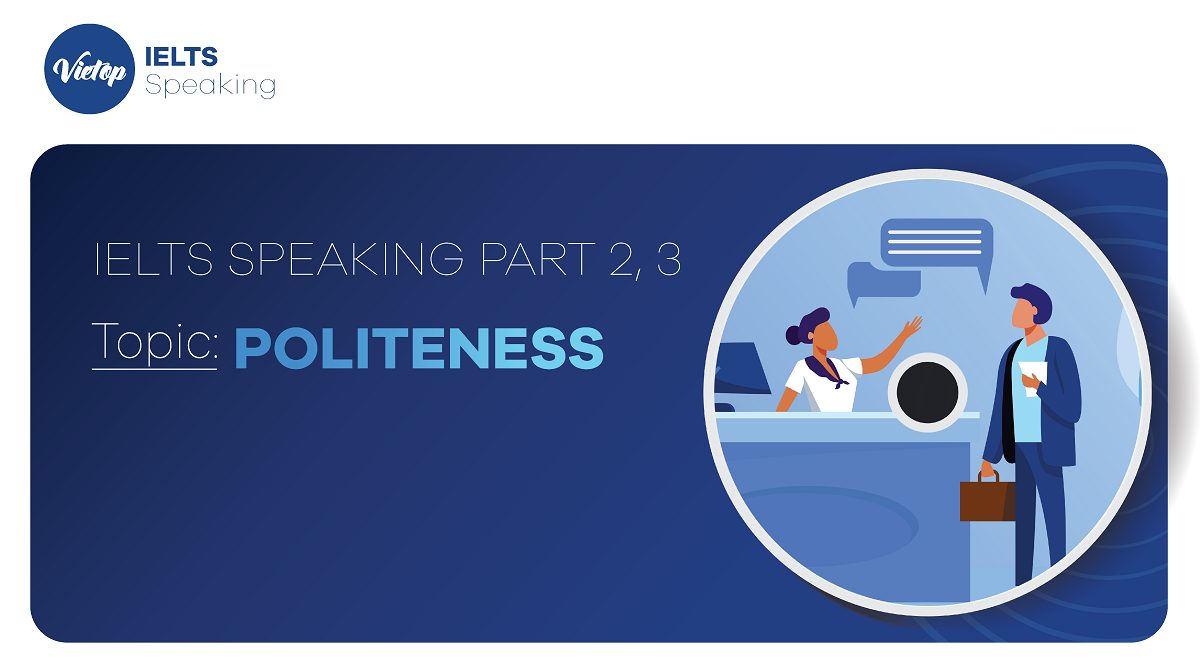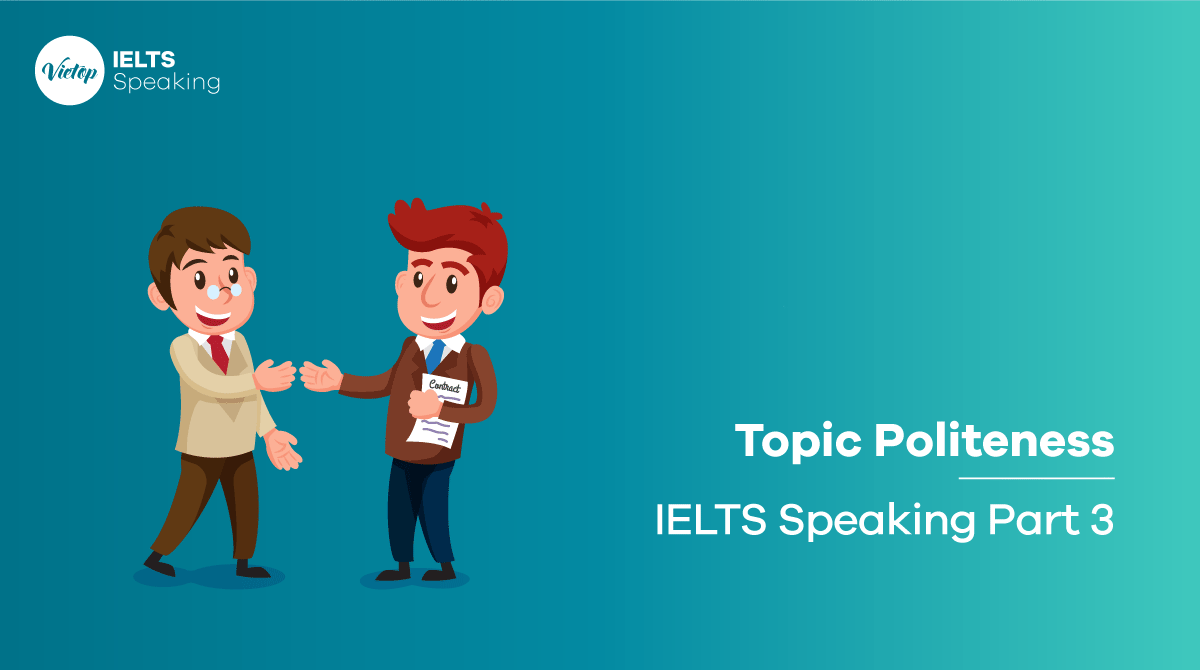Hôm nay IELTS Vietop gửi đến “sĩ tử” chủ đề rất quen thuộc trong cuộc sống hàng ngày đó là topic Politeness trong phần IELTS Speaking.
Cùng xem bài mẫu ngay bên dưới nhé!
1. Bài mẫu topic Politeness – IELTS Speaking part 2

1.1. Đề bài: Describe a polite person you know
You should say:
- Who this person is
- How you know this person
- What the person looks like
- And explain why you think this person is polite
1.2. Sample
I’d like to talk about an extremely polite person that I met when I went to Nha Trang on my last vacation. Her name was Thao and I met her for the first time at the front desk of the 5-star hotel that I intended to stay at. She was working there as a receptionist and she wore a beautiful light-blue Ao Dai, you know, the traditional dress of Vietnamese people. My first impression about her was that she had a great smile and she’s actually quite tall, but I became even more impressed with her personality and demeanor during the couple of days that I was at the hotel.
Because she was the receptionist of the hotel, I had to talk to her whenever I needed anything ranging from room service to inquiry about local tourist attractions and restaurants. She always seemed to be glad to help. She listened to my questions attentively and responded aptly. She usually ended her answers by asking if I had other requests. Her politeness and hospitality made me feel really valued as a guest and I had such a great time.
Well, even though she worked in the hospitality field, I think her politeness came from her personality and not her professional training. I say this because I felt the way she carried herself was totally natural and unforced. A lot of the time, a person behaves politely only because it’s their job and you can actually feel it. This wasn’t the case for Thao at all. I think she chose the right job for her personality.
1.3. Vocab
- Front desk (n): bàn tiếp tân
- Receptionist (n): nhân viên lễ tân
- Demeanor (n): hành vi, cách hành xử
- Room service (n): dịch vỵ phục vụ phòng
- Attentively (adv): một cách chăm chú
- Aptly (adv): thích hợp
- Hospitality (n): (1) sự hiếu khách, (2) dịch vụ khách hàng (ngành học, mảng công việc)
- To be the case: là trường hợp.
Xem thêm:
- Topic Flowers – Bài mẫu IELTS Speaking part 1
- Bài mẫu topic Resting – IELTS Speaking part 1
- Bài tập topic Singing IELTS Speaking part 1

Nhận tư vấn miễn phí khóa học hè
2. Bài mẫu topic Politeness – IELTS Speaking part 3

2.1. How do people show politeness in your country?
In Vietnam, as a young person, I have to do a lot of things to be considered polite. When people my age talk to older people, we have to use honorifics. We have strict rules for that. Another set of etiquette is related to traffic. When you’re driving your vehicles, especially during rush hours, you shouldn’t honk the horn unnecessarily. It’s really rude! A lot of people still do it and it’s considered bad mannered.
- Strict rules: quy tắc nghiêm ngặt
- Etiquette: phép lịch sự
2.2. Are people today as polite as people were in the past?
Honestly, I don’t know. Even though it seems like people today have less rules and etiquettes that they have to follow compared to people from older generations, younger people are still very respectful and well mannered.
I don’t have a definite explanation for this but I think that social media and cell phones have helped people to keep themselves polite. If your actions can be recorded and replayed many times, more people will choose to act politely rather than being rude.
2.3. How do people in your country show politeness?
Based on my observations, expressing gratitude often equates to saying “Thank you.” It’s a societal norm instilled in us to show appreciation for any form of assistance, regardless of its scale.
However, the definition of “help” and “support” varies among individuals. In contemporary times, I’ve noticed a trend where many don’t view service workers such as cashiers or coffee shop baristas as individuals deserving of gratitude, assuming that their service is a paid transaction, hence omitting expressions of thanks. This perspective is perplexing to me.
Personally, saying “thank you” signifies appreciation for life’s simple gestures, and in my view, acknowledging these individuals is crucial. Additionally, it’s a way to ensure good service, as I make it a habit to thank my baristas, possibly preventing any unpleasant scenarios.
- Expressing gratitude: bày tỏ lòng biết ơn
- Acknowledging: thừa nhận
2.4. What kinds of behaviors are not polite?
Among all the impolite behaviors I’ve witnessed, the most repugnant and disrespectful act would undoubtedly be coughing or sneezing without covering one’s mouth and nose. It doesn’t require any lessons in etiquette or manners to recognize the sheer disrespect in such actions.
Beyond being unhygienic, the raw and uncontrolled sound accompanying a sneeze can be deeply unpleasant to the ears. The failure to acknowledge this demonstrates a profound lack of consideration for others. Some individuals exacerbate this behavior by spitting phlegm on the ground afterward, further compounding the distastefulness of the situation.
In fact, I recall an incident where I hastily ended a date. My date, before entering the restaurant where we were supposed to meet, indulged in these unhygienic habits in the parking lot. Subsequently, upon joining me at the table, I noticed a speck of phlegm lingering on his upper lip, which was incredibly repulsive. Apologizing and citing an excuse, I felt compelled to leave the situation immediately.
- Demonstrates: chứng tỏ
Trên đây là bài mẫu về topic Politeness trong IELTS Speaking part 3, IELTS Speaking part 2. Hy vọng với những gì IELTS Vietop chia sẻ trên sẽ giúp ích được cho bạn trong quá trình luyện thi IELTS tại nhà trong mùa dịch này. Và nếu có thắc mắc gì về nội dung trên thì hãy lại bình luận bên dưới để được giải đáp nhé! Chúc bạn đạt được kết quả thi thật tốt!











